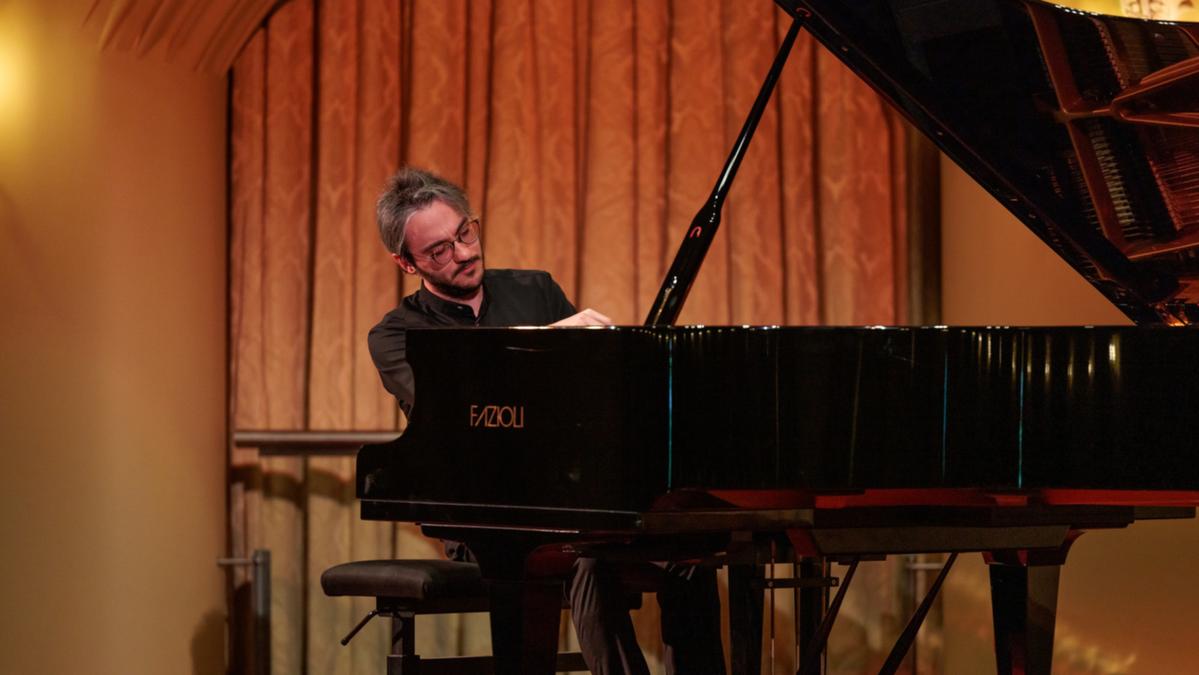
Alexander Gadjiev showed why he won 2021 Sydney International Piano Competition when he played fantasies on the Government House Fazioli grand piano on Sunday.
His technique was beyond reproach and his expression powerful and varied as he demonstrated how he took multiple categories of last year’s delayed, online contest, including programming skills and audience communication.
A dark rumbling in bass established a strangely familiar progression in the world premiere of Colin Spiers’ Eine Kleine Nachtmusik, a febrile left-hand motif leaping to the upper register.
An elaborate soundscape used the full range of pitch, tone and dynamics in a smorgasbord of piano mastery, settling at the last to somnolence in the first movement, Hallway.
For the second stanza, Duality, a bright attack in crushed chords led in fragmented melody as if switching from darkened interior to outdoor light; virtuosic bounds, runs and glissando creating a multifaceted ambience, glittering in sharp relief.
Jagged figures wrung the maximum impact from the Fazioli without overloading the room; dismounting in conclusion with gymnastic agility.
Two late Chopin works followed, deepening the context of the Spiers.
A simple descending movement into the Prelude in C-sharp minor Op. 45 summoned denser resonance with almost pastoral highlights, warming in ebbs and flows, exploratory and reflective; restive and restless qualities resolving at the last to a slow fade.
Polonaise fantasie in A-flat major Op. 61 opened dramatically, the Polish master reflecting his avant-garde Parisian ambience yet still clinging to the nationalist spirit that marked him as revolutionary.
Again, Gadjiev left nothing to doubt, coaxing every ounce of expression out of the work in a live-wire rendition with a relaxed intensity and laser-like focus.
In the more Romantic episodes he caressed the keys, swelling the theme with fluid phrasing to smooth the percussive effect of the instrument, blending its parts into one voice; all coming together in a reprise of the Polonaise theme, joyously grandiose in the cadence.
After the interval, Schumann’s Fantasie Op.17 sounded one plangent note then a flurry in bass to support a haunting melody, rising in intensity then subsiding to a sigh; the scurrying left hand relenting in a lilting pattern and fading to simple reflection.
A quirky quotation from Beethoven teased expectation then reignited with full Romantic elan; feverish mood swings a hallmark of Schumann, soave and grandiloquent in conclusion.
Pealing bells introduced a march for the second stanza, as frankly joyful as the opening was complex and compelling; channelling the bells once more for an anthemic celebration, breaking to a thrilling cadenza then a romp and flourish to finish.
It seemed unlikely Gadjiev could top that, but the spirit of Beethoven crept in again with grace and feeling for the finale.
A duet of left and right hand — bass and soprano, Robert and Clara Schumann — evoked the passionate couple with operatic fervour; cooling to elegiac calm then returning to heriocs, mix and repeat, before waning like a sunset in the cadence.
In encore, Gadjiev first calmed the farm with Chopin’s E-minor Prelude, then left a blistering memory of the afternoon’s high drama in the D-minor Prelude: a glow to counter clouds on the western horizon.
Music on the Terrace concludes 2022 with Jazz on the Lawn, with the WA Jazz Project on Sunday, December 4, 4pm in Government House Gardens.